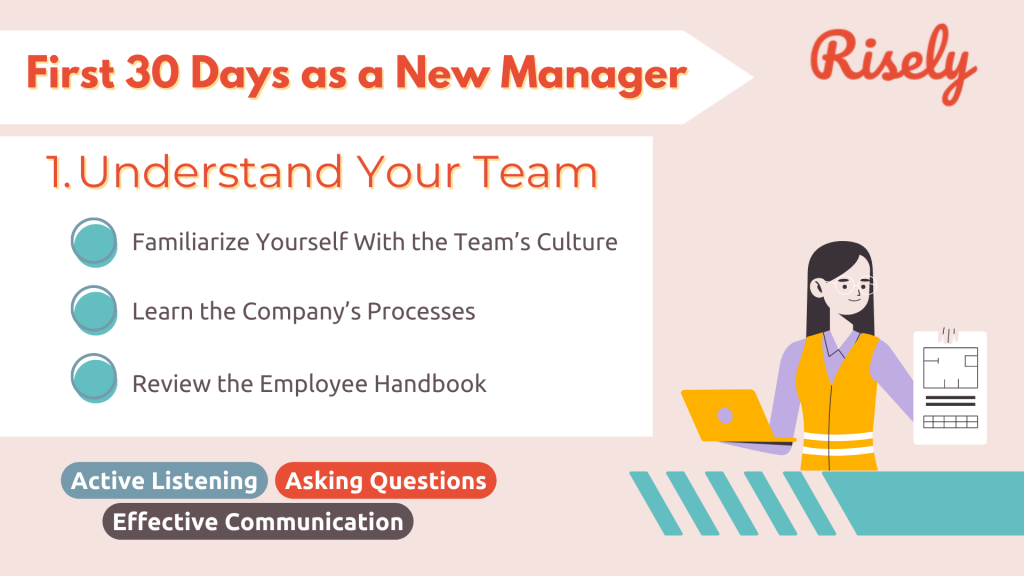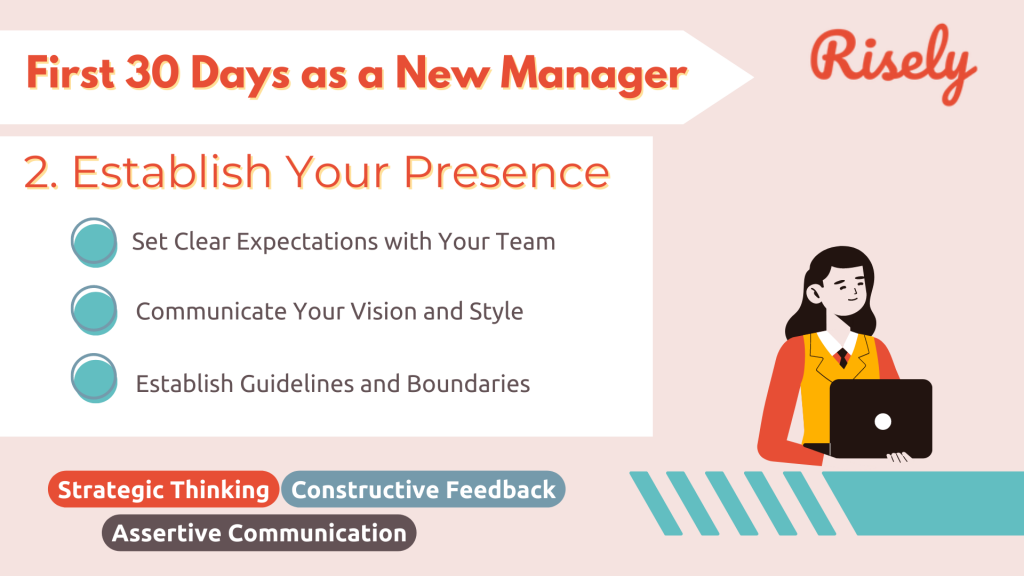Roadmap to the First 30 Days as a New Manager: 14 Things to do
Congratulations on your new role as a manager! The first 30 days can be overwhelming, but you can hit the ground running with a roadmap to guide you. In this blog, we will share five essential steps that you can take to set yourself up for success. Firstly, we will talk about setting clear expectations by defining goals & objectives and communicating your management style. Secondly, building relationships with your team is crucial for creating a positive work culture. We will discuss how holding an introductory team meeting, scheduling 1:1s, and soliciting feedback can help you build trust with your team. Finally, we will wrap up by discussing the importance of learning the company culture and processes, including familiarizing yourself with the team’s culture, reviewing the employee handbook, and learning internal procedures and technology. Following these steps, you can smoothly transition into your new role and establish yourself as an effective manager.What should a manager do in the first 30 days?
- First, planning for the first 30 days helps you navigate the new environment much more quickly. Rather than being lost amid novelty, you can focus on the central issues and start on a positive note.
- Second, a plan helps you set the tone for your management and leadership style. As a result, your team members also understand what they can expect and adapt accordingly.
- Third, planning promotes understanding. It gives you dedicated time to comprehend the team’s processes and norms and set up connections with your team members.
Understand Your Team

Familiarize Yourself With the Team’s Culture
Familiarizing oneself with the team’s culture is essential to get the initial 30 days as a manager right. Your team’s culture summarizes established practices and norms that can guide you in confusing situations. Hence, understanding how your team and colleagues communicate, dress, and behave in the workplace is crucial to building good relationships. Observe the communication styles, work ethics, and values to ensure you fit in with your team. As you navigate the team culture, don’t hesitate to ask questions or seek feedback from peers and superiors. It will help you better understand the company’s values and goals. Knowing the company culture will enable you to make better decisions and be more effective as a manager. In addition, by taking the time to familiarize yourself with your new workplace, you’ll be setting yourself up for success in your new role. Read more: Serious about building culture? You must read these booksLearn the Company’s Processes
Learning and understanding the team’s processes is essential for a new manager. Learn the techniques and procedures of your department or team and how they fit into the larger organizational structure. Building relationships with your team members and colleagues is crucial to establish trust and open lines of communication for cross-functional collaboration. Identify areas for improvement or opportunities to streamline processes, as this can increase productivity and efficiency. Seeking feedback from your team and superiors will help you understand if you meet expectations and positively impact your new role. Keeping these essential points in mind during your first 30 days as a new manager will help you establish yourself as an effective leader within your organization.Other Interesting Reads
Review the Employee Handbook
When starting a new management role, it’s essential to take time to learn the company culture and processes. Reviewing the employee handbook is necessary to understand the company’s policies and procedures. The employee handbook provides valuable information about the company’s culture, values, and expectations. As a new manager, taking notes and asking questions about anything unclear or that needs further clarification is crucial. Understanding the employee handbook can help you make informed decisions while ensuring that you follow company policies. Additionally, it can help identify areas where improvements can be made to support employees better. By reviewing the employee handbook, you’ll set yourself up for success as a new manager and contribute to a positive workplace culture.Establish Your Presence

Set Clear Expectations
As a new manager, one of the most important things you can do is to set clear expectations for your team. Start by clearly communicating your expectations to each team member and establish specific goals and objectives for everyone. You should also establish a feedback system to ensure everyone is on the same page and working towards the same goals. Finally, ensure your team understands the company’s mission and vision, which will help them understand their role in achieving those goals. On the flipside, it is crucial to understand and attempt to fulfill the expectations of your team from you as a manager. For instance, a team can expect their manager to show direction and lead decision-making during tough situations. Having a clear understanding of these ideas will help you picture the various aspects of your role better. Read more: Top 10 Tips to Fulfill New Manager ExpectationsCommunicate Your Vision and Style
As a new manager, defining a vision for your team is critical to ensure everyone works towards common goals. You can create a leadership vision statement that sums up your plans. Additionally, communicating your management style can help to establish trust and build strong relationships with your team members. Finally, it’s essential to be transparent about your strengths and weaknesses as a manager and to be open to feedback from your team to improve continuously. Following these steps can create a supportive and productive environment for yourself and your team.Establish Guidelines and Boundaries
As a new manager, it’s important to establish clear expectations and guidelines with your team. Setting out on a new position can be confusing at the onset. Effective communication is essential in any managerial position to navigate through these situations. Setting expectations for how often and in what communication should occur can help ensure everyone is on the same page. Simultaneously, ensuring clarity on professional and personal boundaries helps as well. Moreover, starting on a clear note helps in smooth transitions in case you are moving from the role of a team member to a manager or a team lead. While such transitions can be confusing due to the change in required skills and responsibilities beyond the traditional scope, steps like setting boundaries can provide a corner of relief. Read more: 5 Tips You Need While Transitioning From Peer to ManagerConnect with Your Team

Build Relationships with Your Team
Building relationships with your team is crucial for success as a manager. It will help you to build trust and rapport with your team. Encourage feedback from your team on what is working well and what could be improved. Be transparent in your communication and keep them updated on organizational changes or developments. Show appreciation for your team’s hard work and celebrate their successes. It is essential to provide clear expectations and goals so that everyone knows what they are working towards. Support your team in achieving these objectives by providing training or additional resources as well. Healthy team dynamics can be crucial in a successful managerial stint.Hold an Introductory Team Meeting
An introductory team meeting is one effective way to build relationships with your team. Before the meeting:- Establish its purpose and goals to ensure it runs smoothly.
- During the meeting, take the opportunity to introduce yourself, share your vision, and learn about your team’s goals and challenges.
- Encourage open communication and active listening to create a positive and collaborative work environment.
Schedule 1:1s
Scheduling 1:1 meetings with each team member is an effective way to start. During these meetings, take the time to get to know your team personally and professionally. Ask open-ended questions to know your team and actively listen to their responses to understand their strengths, weaknesses, and work styles. Gathering this information can build rapport and trust with your team. Regular 1:1s can also help identify challenges early on and provide opportunities for continuous feedback. Overall, scheduling regular 1:1s with each team member can foster positive relationships and set the stage for a successful first 30 days as a new manager.Solicit Feedback
As a new manager, building relationships with your team is crucial in establishing trust and achieving success. One effective way to do this is by soliciting feedback from your team. It involves clarifying that you value their opinions and are open to constructive criticism. To create a safe space for feedback, you can allow anonymity or schedule one-on-one meetings. However, it’s crucial to take action on the feedback you receive, even if it’s difficult to hear. By doing so, you show your team that you’re committed to growth and improvement for yourself and the organization. Ultimately, soliciting feedback is essential to building solid relationships with your team and fostering a culture of openness and collaboration. You can use tools like Risely’s assessments for a 360-degree evaluation of your skills. Risely’s leadership skills assessments help managers assess their skills and collect anonymous feedback from their teams into a succinct report. Test your effectiveness as a manager now to unlock your hidden potential! Get started with assessments.Seek Mentorship Opportunities
As a new manager, you can significantly benefit by seeking mentors and coaches to accelerate their professional growth and navigate the challenges of their role. Typically experienced leaders, workplace mentors offer valuable insights, advice, and guidance based on their experiences. They can help you gain perspective, develop leadership skills, and avoid common pitfalls. Leadership coaches, on the other hand, provide personalized and structured guidance, focusing on specific skill development and goal achievement. Both mentors and coaches offer support, encouragement, and an external perspective, enabling the new manager to build confidence, expand their network, and make informed decisions, leading to tremendous success in their managerial journey. Read more: What Is Leadership Development? 5 Reasons Why Every Manager Needs ItPlan Your Managerial Journey

Define Goals and Objectives
As a new manager, setting clear expectations for your team is critical to ensuring success. One way to do this is by defining goals and objectives everyone understands and works towards. Communicating these goals clearly and regularly can help avoid confusion or misalignment within the team. To ensure your goals are effective, it’s essential to make them specific, measurable, achievable, relevant, and time-bound (SMART). It helps ensure they are realistic and attainable while providing a clear roadmap for everyone to follow. Read more: Mastering Your Role with New Manager 30 60 90 Day PlanInitiate Healthy Habits
Starting a new managerial role can be an overwhelming experience, but there are ways to make the ride smoother. For managers, it is crucial to ensure that they are at their best physical and mental state for a fulfilling professional and personal life. It includes providing that you keep sleep deprivation at bay and practicing essential self-care. Moreover, good practices can help you set good examples for your team members. Some helpful resources in this area can be: Read more: How Do Managers Impact Employee Wellness?Organize your Priorities
Setting your priorities straight is essential within the first 30 days as a new manager. You can begin by creating a list of your roles and responsibilities to start with the very basics. Further, you can take up tasks pertaining to the well-being of your team. Lastly, you can include items that focus on your growth, such as creating a leadership development plan, signing up for interesting workshops, and participating in ongoing leadership training initiatives. Overall, craft the big picture and start working from the smallest steps. Read more: The Essential New Manager Checklist for Smart Managers in 20235 Mistakes Managers should Avoid in the First 30 days
Below are the 5 mistakes you should avoid as a new manager.- Being overly authoritarian: During your initial days as a manager, you must not be too bossy or autocratic. Avoid making decisions without involving your team or being overly controlling. Instead, aim for a balanced, collaborative approach.
- Neglecting team building: Failing to invest time in building relationships with your team can be a mistake. In your first month, get to know your team members, their strengths, and what motivates them. Building trust is key.
- Not listening to feedback: Ignoring your team’s feedback or dismissing their suggestions is a standard error. Be open to hearing their ideas and concerns. Your team’s insights can be invaluable for making improvements.
- Micromanaging: Avoid the temptation to micromanage your team’s every move. Trust your team to handle their responsibilities. Constantly breathing down their necks can stifle creativity and demotivate them.
- Not setting clear expectations: Failing to communicate your expectations clearly can lead to confusion. Make sure your team understands their roles, responsibilities, and the goals you’re aiming to achieve together. Clarity is crucial in the first 30 days and beyond.
Conclusion
In conclusion, the first 30 days as a new manager can be overwhelming, but with the right approach, you can set yourself and your team up for success. Setting clear expectations, building relationships, and learning the company culture and processes are key to achieving this. Remembering everyone has a different management style is essential, so don’t be afraid to communicate yourself. Lastly, always be open to feedback, which will help you grow and develop as a leader. Follow these five steps for a smooth transition into your new role.Boost up your skills to ace your new manager role!
Take the leadership skills assessments by Risely to get started on the journey of unleashing your true potential.
Frequently Asked Questions
What should a manager do in the first month?
In the first month as a manager, it’s important to establish open communication with team members, build relationships, and understand the existing work processes. Set clear expectations, learn the team’s strengths and areas for development, and identify potential challenges and opportunities for improvement.
How do you crush your first 30 days as a new manager?
To crush your first 30 days as a new manager, focus on listening, learning, and building relationships. Understand the team’s priorities and goals, develop a clear plan of action, and communicate effectively with all stakeholders. Emphasize collaboration and seek feedback to continuously improve.
What is a 30 60 90 day plan for new people managers?
A 30 60 90 day plan for new people managers is a roadmap for success. In the first 30 days, focus on building relationships and understanding the team’s strengths and challenges. In the next 30 days, identify opportunities for improvement and develop an action plan. Finally, in the last 30 days, implement changes and track progress.
What would you do in the first 3 months of a new job as a manager?
In the first 3 months of a new job as a manager, focus on building relationships, understanding team dynamics, and setting clear expectations. Identify opportunities for improvement and implement changes to streamline processes and enhance performance. Emphasize communication and collaboration to build trust and promote teamwork.
Other Related Blogs
Read this if you think you can run The Bear
Read this if you think you can run The Bear What if your favorite mom-and-pop deli is transformed into something high-end super quick? We are talking of The Bear, Carmy,…
New Managers and Small Teams: A Match Made Not Made In Heaven
New Managers and Small Teams: A Match Made Not Made In Heaven My team currently has nine people, including myself. That sounds pretty simple, right? After all, exactly how much…
Top 10 New Manager Skills That You Must Learn
Top 10 New Manager Skills That You Must Learn Congratulations on your promotion as a new manager! It’s a big transition and can be challenging. You may have been an…
5 Ways of Coaching for New Managers in the Age of AI
5 Ways of Coaching for New Managers in the Age of AI In today’s rapidly evolving business landscape, new managers face unique challenges. Not only do they have to adapt…


